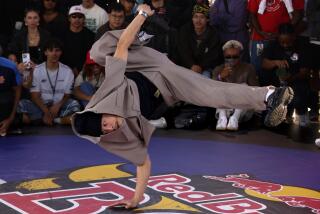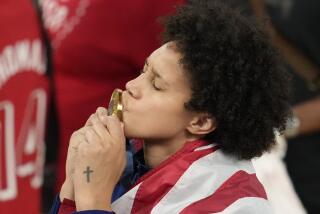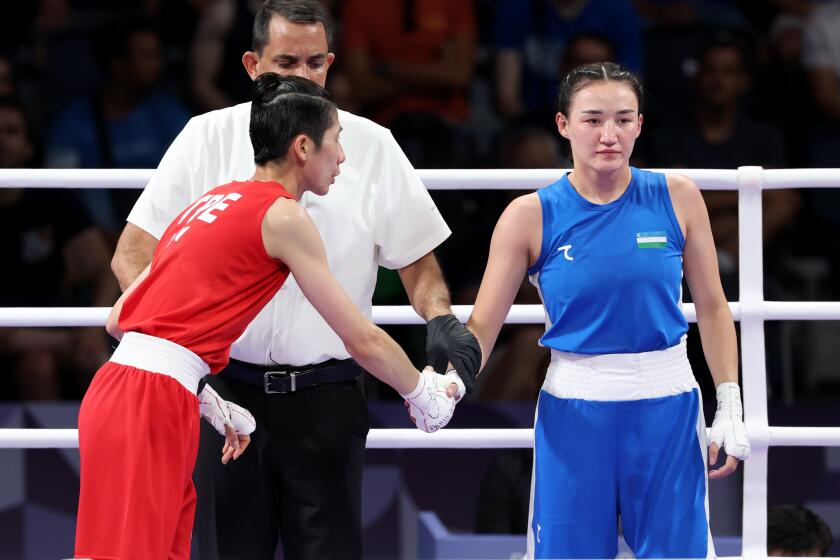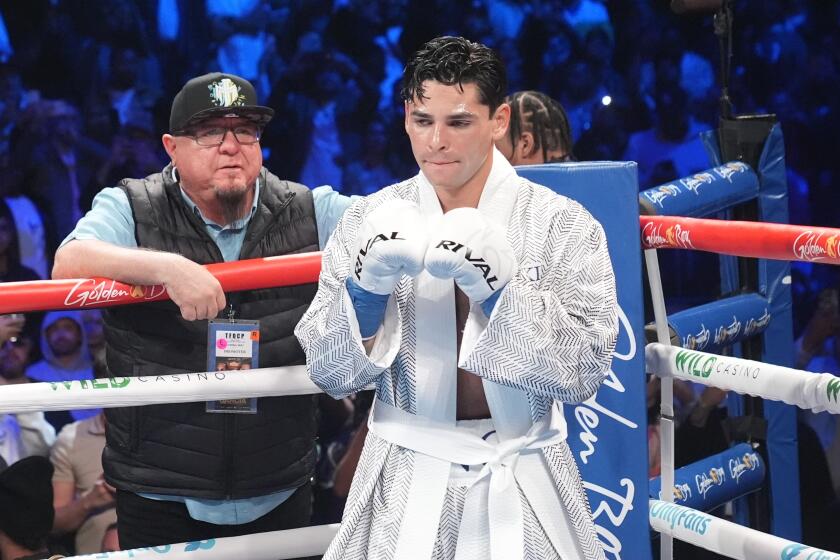BARCELONA ’92 OLYMPICS / DAY 15 : A Special Promise Is Kept : Boxing: East L.A.’s De La Hoya wins gold medal, as he had vowed to do for his dying mother.
BADALONA, Spain — Oscar De La Hoya never said it would be easy. He simply said he would do it.
And Saturday morning, he did.
He won a gold medal for his mother, who, he later said, saw it all. And during the medal ceremony, he almost cried, but didn’t.
The graceful, hard-punching lightweight from the Brooklyn Gym in Boyle Heights managed to pull his exhausted, emotionally spent East Los Angeles cheering section along one more bumpy Olympian road of peaks and valleys Saturday morning.
De La Hoya defeated Germany’s Marco Rudolph on a 7-2 decision, and he did it with a flourish. He knocked the shorter, more muscular German to his knees with a short, crisp left hook to the jaw late in the third and final round. But until near the end, it seemed as if the judges were trying to keep the German as close as possible.
For the U.S. boxers, De La Hoya’s was the final story of a disappointing Olympic Games. There are six more gold-medal bouts today, but no Americans remain in the competition.
After De La Hoya defeated Rudolph in Joventut Pavilion, Chris Byrd, the U.S. middleweight, lost a 12-7 decision to Cuban Ariel Hernandez in another gold medal-bout.
And so it was a gold, a silver and a bronze for Team USA, its worst performance since 1972, when Sugar Ray Seales won the only U.S. gold medal. The total of three boxing medals is the lowest since the 1956 U.S. team won two golds and a silver.
De La Hoya, boxing before a near-capacity crowd in the 5,000-seat arena, not only fulfilled a two-year-old pledge to his late mother, but he did it by beating the only opponent to defeat him in the last five years.
Cecilia De La Hoya skipped a week of radiation treatments for breast cancer in the summer of 1990 to watch her son box in the Seattle Goodwill Games. She and her husband, Joel, told their son of the illness when they returned home.
At the time, he promised her he would win a gold medal in Barcelona. His mother died that October.
And after De La Hoya had done it, in the two-week tournament’s 323rd bout, he looked up from the victory platform as the American flag was raised to the ceiling, and nearly broke down.
“I was afraid I might start to cry,” he said later, “but then I figured my Mom would say: ‘Don’t cry, be happy--you won the gold medal.’
“Then I realized she wasn’t there to hug me, and I started feeling sad all over again.”
His father sat in the first row of the balcony, behind the “Good Luck, Oscar!” banner, his eyes filled with tears. “Oscar has made us all so happy,” he said, his voice breaking.
“He fought his kind of fight today, and he wasn’t tight, like he was against the Korean. But those judges, they didn’t give him anything. These judges, they don’t like the USA.”
Adrian Pasten, De La Hoya’s cousin and next-door neighbor in East Los Angeles, was also overcome by the medal ceremony.
“Oscar came here (to Spain) with a heavy heart, because of his mother,” Pasten said. “But he’s a happier man today because he was able to fulfill his pledge to her. And we’re all so happy we could be here to support him.”
De La Hoya’s cousin, Ale, also wept. “He won this for my aunt (the boxer’s mother)--it was his dream and he made us all so happy.”
De La Hoya outjabbed, outmoved, outpunched and generally outboxed his German rival from the opening minutes, but the judges--from Pakistan, Nigeria, Independent Olympic Committees (Yugoslavia), Cuba and Argentina-- credited few of his punches.
De La Hoya appeared to land perhaps a dozen scoring punches during the first round, and Rudolph perhaps eight. But the score the judges posted after the opening round was 1-1.
De La Hoya then was knocked off-balance by Rudolph, who scored a 17-13 victory over De La Hoya at the World Championships at Sydney in November.
With 55 seconds to go in the second round, Rudolph was wobbled by a left hook to the chin and a left to the ribs. Then De La Hoya launched a flurry that knocked him backward.
De La Hoya also landed a left hook to Rudolph’s head at the bell, but the judges awarded him only a 3-2 lead after two rounds.
But during the third round, De La Hoya forced the issue. With 1:10 to go, in a flurry of punches near center ring, De La Hoya caught Rudolph on the side of the jaw with a short left counter the German apparently never saw coming. Rudolph sagged, then took a standing eight count.
De La Hoya, from a neutral corner, sneaked a look into the balcony, where friends and family were cheering.
Rudolph finished the match on slightly wobbly legs, and De La Hoya closed with two left hooks at the bell. When it ended, the German hugged De La Hoya.
In the 165-pound final, Byrd, of Flint, Mich., spent much of the first round showboating and making faces at Cuba’s Ariel Hernandez, and in the end it may might have cost him the gold medal.
Two bouts after De La Hoya’s, Byrd and Hernandez at first drew boos from the crowd, annoyed by the lack of action. Hernandez was extremely careful against the American, who is a counter-punching specialist.
And so they stalked each other throughout an opening round that was scored 1-1.
Hernandez, apparently turned loose by Cuban Coach Alcides Sagarra between rounds, came out charging for the second. Suddenly, there was a wild exchange of punches, with both men landing. Afterward, referee Jack Poucher of Ireland cautioned Byrd for talking.
With 30 seconds left in the second round, Hernandez caught Byrd with a 1-2 combination, the most effective punches of the bout.
The two lapsed back into their slow-motion pantomime during the third round. With a minute to go, it seemed as if the match was up for grabs, but Hernandez appeared to score at least four times in the final 45 seconds to pull away.
Later, there were no complaints about the decision. Said U.S. boxing Coach Joe Byrd, Chris’ father: “I thought maybe it could have gone to either boxer by one or two points.”
Boxing
Medalists
* 106 POUNDS
GOLD: Rogelio Marcelo (Cuba)
SILVER: Daniel Bojinov (Bulgaria)
BRONZE: (tie) Jan Quast (Germany)
BRONZE: Roel Velasco (Philippines)
* 119 POUNDS
GOLD: Joel Casamayor (Cuba)
SILVER: Wayne McCullough (Ireland)
BRONZE: (tie) Li Gwang Sik (North Korea)
BRONZE: Mohamed Achik (Morocco)
* 132 POUNDS
GOLD: Oscar De La Hoya (United States)
SILVER: Marco Rudolph (Germany)
BRONZE: (tie) Hong Sung Sik (North Korea)
BRONZE: Namjil Bayarsaikhan (Mongolia)
* 147 POUNDS
GOLD: Michael Carruth (Ireland)
SILVER: Juan Hernandez (Cuba)
BRONZE: (tie) Arkom Chenglai (Thailand)
BRONZE: Anibal Acevedo (Puerto Rico)
* 165 POUNDS
GOLD: Ariel Hernandez (Cuba)
SILVER: Chris Byrd (United States)
BRONZE: (tie) Chris Johnson (Canada)
BRONZE: Lee Seung Bae (South Korea)
* 201 POUNDS
GOLD: Felix Savon (Cuba)
SILVER: David Izonritei (Nigeria)
BRONZE: (tie) David Tua (New Zealand)
BRONZE: Arnold Van Der Lijde (Netherlands)
More to Read
Go beyond the scoreboard
Get the latest on L.A.'s teams in the daily Sports Report newsletter.
You may occasionally receive promotional content from the Los Angeles Times.










